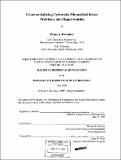Commercializing university biomedical ideas : problems and opportunities
Author(s)
Bornstein, Bruce Alan
DownloadFull printable version (4.437Mb)
Advisor
Edward B. Roberts.
Terms of use
Metadata
Show full item recordAbstract
The level of entrepreneurship and commercialization of inventions at universities in the United States varies widely. This study attempts to uncover the factors that may explain the differences in the attitude toward entrepreneurship and commercialization found at academic institutions. To this end nineteen interviews with faculty researchers, inventors, entrepreneurs, venture capitalists, technology transfer officers, and others were conducted. The different perceptions toward entrepreneurship and commercialization at the Massachusetts Institute of Technology, Harvard University, and Harvard Medical School and its associated research hospitals were examined with particular care. Several factors that are significant in promoting entrepreneurship and interest in the commercialization of ideas were identified. Although these factors may account for the observed differences, no one factor was singled out as being the most important. These factors include the presence of mentors and role models, the composition of the institution's intellectual property, cultural differences, the conflict of interest policy, a critical mass of people, the technology transfer process, and the availability of university venture funds. Many of those interviewed believed that the nature of intellectual property and accessibility to mentors and role models by the researchers and inventors were probably the most significant of all factors for enhancing entrepreneurship.
Description
Thesis (M.B.A.)--Massachusetts Institute of Technology, Sloan School of Management, 1999. Includes bibliographical references (leaves 89-90).
Date issued
1999Department
Sloan School of ManagementPublisher
Massachusetts Institute of Technology
Keywords
Sloan School of Management